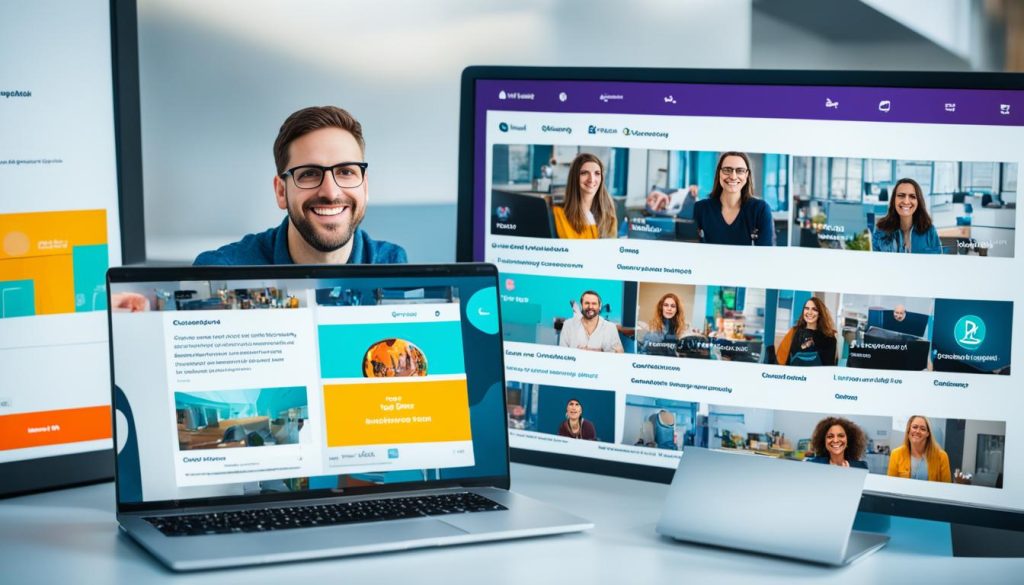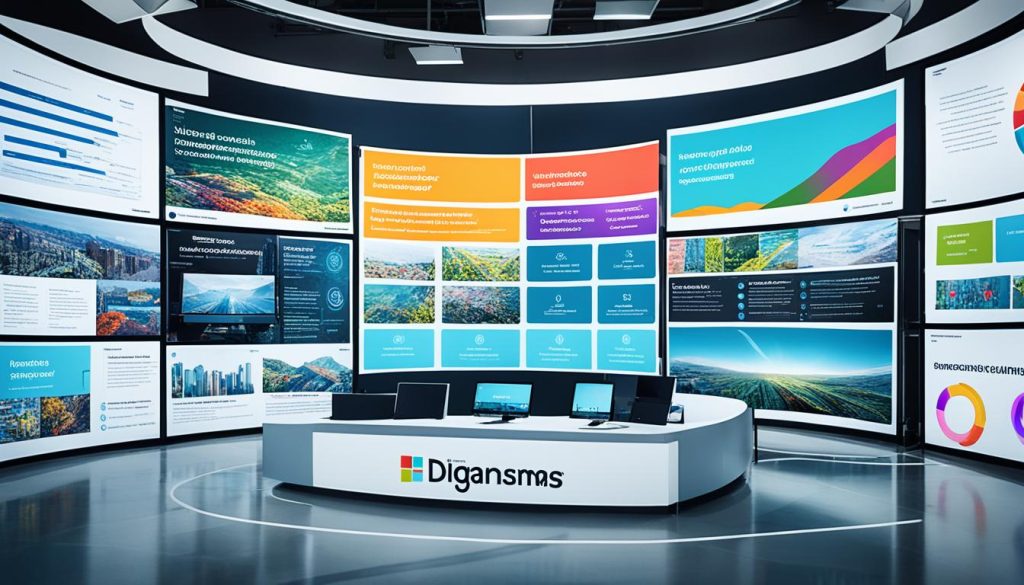In today’s digital age, online courses have become a game-changer in the pursuit of knowledge. Whether you’re interested in skill development programs, professional certification courses, webinar series, or distance learning opportunities, the world of online education offers a virtual smorgasbord of options to choose from. Gone are the days when physical limitations or time constraints hindered our quest for learning. With just a few clicks, you can embark on a journey of intellectual growth and development from the comfort of your own home or office.
Online courses have transformed the learning landscape, breaking down barriers and making education accessible to a wider audience. They provide virtual classroom experiences that are just as engaging and interactive as in-person workshops or lectures. E-learning platforms have revolutionized the way we acquire new skills, broaden our horizons, and earn continuing education credits. With online tutorials and workshops, the opportunities for personal and professional growth are endless.
Key Takeaways:
- Online courses offer a wide range of subjects and learning opportunities.
- They provide flexibility and convenience, allowing you to learn at your own pace and from anywhere.
- E-learning platforms like Coursera, Udemy, edX, and Khan Academy offer a diverse array of courses.
- Online courses incorporate engaging multimedia content and interactive elements for effective learning.
- Online learning promotes a learner-centric approach, tailoring courses to different learning styles and fostering community engagement.
The Advantages of Online Learning
Online learning offers a diverse array of subjects and brings numerous advantages for individuals seeking to expand their skills and knowledge. Let’s explore some of the key benefits that make online courses a popular choice:
- Accessibility: Online courses are accessible to anyone with an internet connection, breaking down geographical barriers and providing opportunities for learners worldwide.
- Flexibility: Online learning offers flexible schedules, allowing learners to study at their own pace and balance their educational pursuits with other commitments.
- Diverse array of subjects: Online courses cover a wide range of subjects, from academic disciplines to practical skill development, ensuring that learners can find courses aligned with their interests and goals.
- Personalized learning experiences: Online courses often provide personalized learning experiences, allowing learners to tailor their education according to their unique needs and preferences.
- Cost-effectiveness: Online courses are often more cost-effective than traditional classroom-based learning, with lower tuition fees and the elimination of additional expenses such as commuting and accommodation.
- Convenience: Online learning offers the convenience of accessing courses from anywhere, anytime, providing learners with the freedom to study in a comfortable environment that suits their needs.
By embracing online learning, individuals can benefit from the convenience, flexibility, and personalized nature of these courses. Whether you’re looking to acquire new skills, pursue a passion, or advance your career, online courses provide a convenient and cost-effective way to achieve your educational goals.
Types of Online Courses and Tutorials
Online learning offers a diverse range of courses and tutorials to cater to a variety of interests and goals. Whether you are looking to earn academic degrees and certifications, acquire practical skills, pursue creative hobbies, or advance your professional development, there are online courses available to suit your needs. Let’s explore the different types of online courses and tutorials:
1. Academic Courses
Academic courses offered online provide learners with the opportunity to earn degrees, diplomas, or certifications in various fields of study. Universities and educational institutions offer a wide range of online programs, ensuring accessibility and flexibility for students. Whether you’re interested in a bachelor’s degree in computer science or a postgraduate certificate in business administration, you can find academic courses that align with your educational aspirations.
2. Skill-based Courses
Skill-based online courses are designed to provide practical training and develop specific skills that are in demand in the job market. These courses cater to individuals seeking to acquire new skills or enhance their existing ones. From coding and graphic design to project management and digital marketing, skill-based courses offer comprehensive training and hands-on experience to help learners succeed in their chosen profession.
3. Creative Tutorials
Creative tutorials are tailored for individuals interested in exploring their artistic talents and pursuing creative hobbies. These courses cover a broad range of creative disciplines such as painting, photography, writing, music, and crafts. Whether you’re a beginner looking to learn the basics or an experienced artist wanting to refine your skills, creative tutorials offered online provide a convenient and interactive learning experience.
4. Professional Development Courses
Professional development courses focus on enhancing skills and knowledge in specific industries or professions. These courses are designed to help individuals advance their careers and stay updated with the latest industry trends and practices. Whether you’re looking to improve your leadership skills, acquire project management certifications, or enhance your business acumen, professional development courses offer targeted training to support your career growth.
With such a wide variety of online courses and tutorials available, learners have the freedom to choose courses that align with their interests, goals, and schedules. Whether you’re pursuing higher education, seeking practical skills, nurturing your creative side, or advancing your career, online courses empower you to unlock your full potential.
The Rise of E-Learning Platforms
E-learning platforms such as Coursera, Udemy, edX, and Khan Academy have revolutionized the way people access online courses and acquire new skills. With their user-friendly interfaces and diverse range of courses, these platforms have become go-to destinations for learners worldwide.
One of the key factors contributing to the popularity of these e-learning platforms is the exceptional user experience they offer. Learners can easily navigate through the platforms, search for courses based on their interests, and enroll in a few simple clicks. This intuitive interface ensures a seamless learning experience, allowing individuals to focus on acquiring knowledge rather than grappling with technicalities.
“I’ve used multiple e-learning platforms, and Coursera stands out for its user-friendly design and smooth course enrollment process. I appreciate how easy it is to explore different subjects and find courses that align with my goals,” says Jennifer, a satisfied learner.
Furthermore, e-learning platforms provide a vast array of courses catering to various interests and skill levels. From academic courses offered by prestigious universities to specialized skill-based courses and creative tutorials, there is something for everyone. Learners have the flexibility to choose courses that align with their individual learning goals, whether they are seeking professional certifications, developing new skills, or pursuing personal interests.
These platforms also incorporate interactive features that enhance the learning experience. Learners can engage with instructors and peers, fostering a sense of community and collaboration. Discussion forums allow learners to ask questions, share insights, and learn from each other’s experiences. Multimedia content, including videos, quizzes, and interactive exercises, provide a dynamic and engaging learning environment.
E-learning Platform Comparison
Here is a comparison of the key features and offerings of some popular e-learning platforms:
| E-Learning Platform | Features | Courses Offered | User Reviews |
|---|---|---|---|
| Coursera | User-friendly interface, interactive learning, verified certificates | Academic, professional, and personal development courses | ⭐⭐⭐⭐⭐ |
| Udemy | Wide variety of courses, affordability, lifetime access | Skill-based, creative, and professional courses | ⭐⭐⭐⭐⭐ |
| edX | Partnerships with top universities, free access to course materials | Academic and professional courses | ⭐⭐⭐⭐ |
| Khan Academy | Free access to educational resources, personalized learning | Academic courses, test preparation | ⭐⭐⭐⭐ |
Overall, e-learning platforms have transformed the landscape of online education, enabling learners to access quality courses from the comfort of their homes. The interactive features, diverse course options, and user-friendly interfaces offered by these platforms have reshaped the way people acquire knowledge and skills.

Crafting Effective Online Courses
Designing and implementing effective online courses requires careful consideration of pedagogical strategies, the use of engaging multimedia content, incorporation of interactive elements, and prioritizing the user experience. By following these best practices, instructors can create courses that captivate learners, deliver valuable information, and foster meaningful engagement.
Pedagogical Considerations
When designing online courses, it is essential to take pedagogical considerations into account. This involves selecting instructional methods and strategies that align with the learning objectives and desired outcomes. By utilizing proven pedagogical approaches such as active learning, problem-solving tasks, and reflective exercises, instructors can enhance the effectiveness of online courses.
Engaging Multimedia Content
To keep learners engaged and motivated throughout the course, it is crucial to incorporate captivating multimedia content. This may include videos, infographics, interactive presentations, and audio recordings. By leveraging the power of multimedia, instructors can communicate complex concepts effectively, appeal to different learning styles, and create an immersive learning experience.

Interactive Elements
Integrating interactive elements into online courses promotes active learning and enhances learner engagement. This can be accomplished through interactive quizzes, discussion forums, virtual simulations, and collaborative projects. By providing opportunities for learners to interact with the content and each other, instructors facilitate deeper understanding and knowledge retention.
User Experience
An exceptional user experience is paramount in ensuring the success of online courses. User-friendly interfaces, intuitive navigation, and responsive design contribute to a seamless learning journey. Instructors should optimize the course platform to be accessible on various devices and prioritize clear communication channels to address learner questions and concerns effectively.
By considering pedagogical strategies, incorporating engaging multimedia content, implementing interactive elements, and prioritizing the user experience, instructors can craft online courses that empower learners and provide them with a transformative educational experience.
Learner-Centric Approach to Online Learning
Online learning offers a unique opportunity to tailor courses to the specific needs and preferences of individual learners. By understanding that each learner has a distinct learning style and pace, online courses can be designed to accommodate diverse learning needs, promoting engagement and knowledge retention.
Tailoring courses is a key aspect of a learner-centric approach. It involves creating learning experiences that align with the interests, goals, and prior knowledge of the learners. This customization can be achieved through the use of adaptive learning technologies, personalized assessments, and targeted content delivery.
Another crucial component of a learner-centric approach is self-paced learning. Online courses allow learners to progress through the material at their own speed, ensuring comprehension and mastery before moving on. This flexibility promotes a deeper understanding of the subject matter and empowers individuals to take ownership of their learning journey.
Feedback mechanisms are essential in online learning to provide learners with constructive input and support continuous improvement. Through interactive assessments, quizzes, and assignments, learners receive immediate feedback on their progress, identifying areas for growth and reinforcing their learning.
Moreover, fostering a sense of community and collaboration among learners is crucial in an online learning environment. Discussion forums, virtual study groups, and collaborative projects create opportunities for learners to connect with peers, share ideas, and learn from each other’s experiences. The sense of community and collaboration enhances motivation, engagement, and a deeper understanding of the subject matter.
Benefits of a Learner-Centric Approach
“Tailoring courses to individual learning styles and preferences enhances learner engagement and knowledge retention. Self-paced learning promotes a deeper understanding of the material, while feedback mechanisms foster continuous improvement. By fostering a sense of community and collaboration, learners can benefit from shared experiences and diverse perspectives.”
| Benefits of a Learner-Centric Approach |
|---|
| Enhanced learner engagement |
| Improved knowledge retention |
| Deeper understanding of the material |
| Continuous improvement through feedback |
| Opportunities for community and collaboration |
By embracing a learner-centric approach to online learning, individuals can maximize their educational experience by customizing courses to their learning preferences, progressing at their own pace, receiving valuable feedback, and connecting with a supportive learning community.
Conclusion: Embracing the Digital Classroom
In this article, we have explored the transformative impact of online courses on education and the future of online learning. Online courses have revolutionized the way we acquire knowledge, providing opportunities for individuals to expand their skills and expertise in diverse subjects. The convenience and flexibility of online learning have made it a popular choice for learners of all ages and backgrounds.
However, online learning also comes with its challenges. Adapting to a digital classroom environment can require adjustment, and staying motivated and engaged can sometimes be a hurdle. Additionally, the absence of face-to-face interaction and hands-on learning experiences may pose challenges for certain subjects or skill development.
Nevertheless, the future of online learning is promising. With advancements in technology, the possibilities for interactive and immersive learning experiences are expanding rapidly. Artificial intelligence, virtual reality, and augmented reality are revolutionizing the way we learn, providing dynamic and personalized learning environments. It is a future where anyone, anywhere can access quality education, breaking down barriers and creating a more inclusive society.
By embracing the digital classroom, learners can tap into the unlimited potential of online courses and shape a brighter and more informed future. As the landscape of education continues to evolve, online learning will play an increasingly vital role in providing accessible, affordable, and engaging learning opportunities for all.
FAQ
What are the advantages of online learning?
Online learning offers easy accessibility, flexible learning schedules, a wide range of subjects to choose from,
personalized learning experiences, cost-effectiveness, and convenient access from anywhere.
What types of online courses and tutorials are available?
Online courses and tutorials include academic courses that offer degrees and certifications, skill-based courses for practical training,
creative tutorials for hobbyists, and professional development courses for career advancement.
Which e-learning platforms are popular for online courses?
Popular e-learning platforms include Coursera, Udemy, edX, and Khan Academy, which provide user-friendly interfaces,
a wide range of courses, and interactive features that enhance the learning experience.
What considerations should be made when designing online courses?
When designing online courses, instructors should consider pedagogical approaches, incorporate engaging multimedia content,
utilize interactive elements, and ensure a seamless user experience.
How can online courses be tailored to individual learners?
Online courses can be tailored to individual learners by offering different learning styles, self-paced learning options,
feedback mechanisms for improvement, and fostering a sense of community and collaboration among learners.
How have online courses transformed education?
Online courses have transformed education by unlocking knowledge, providing accessible learning opportunities,
and shaping a brighter and more informed future. However, they also present challenges that need to be addressed.
What does the future hold for online learning?
The future of online learning is bright, with continuous advancements in technology and pedagogy.
It is expected to expand further, offering more innovative learning experiences to a global audience.




No comments! Be the first commenter?